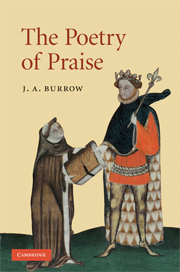Book contents
Introduction: from Pindar to Pound
Published online by Cambridge University Press: 22 September 2009
Summary
O bright Apollo,
Τίνʾ ʾανδρα, τίνʾ ʿήρωα, τίνα θ∊όν,
What god, man, or hero
Shall I place a tin wreath upon!
In these lines from his poem Hugh Selwyn Mauberley, Ezra Pound cites words taken from the opening of the second Olympian Ode by Pindar: ‘What God, what hero, aye, and what man shall we loudly praise?’ Pindar's ode addresses its praise to a Sicilian lord, Theron, on the occasion of his victory in an Olympic chariot race run in 476 bc; and the following lines couple Theron's name with those of a god, Zeus, and a hero, Hercules. As a model of encomiastic writing, the poem was imitated by many successors, among them Horace in an ode praising Augustus (i.xii, ‘Quem virum aut heroa …’). Neither Pindar nor Horace displays any doubt that there was indeed a great man to be celebrated, as well as gods and heroes with whom he might appropriately be coupled. By contrast, Ezra Pound's questions clearly expect no positive answers. There are no gods or heroes any more; and the most a contemporary might deserve would be a victor's wreath of base metal. The epithet ‘tin’, derived from the interrogative adjectives (Τίνʾ, ‘what’) in Pindar's line, lowers the Greek to what Pound, in the same poem, characterises as the ‘tawdry cheapness’ of modern times: tin gods, tin heroes, tin men.
- Type
- Chapter
- Information
- The Poetry of Praise , pp. 1 - 5Publisher: Cambridge University PressPrint publication year: 2008



